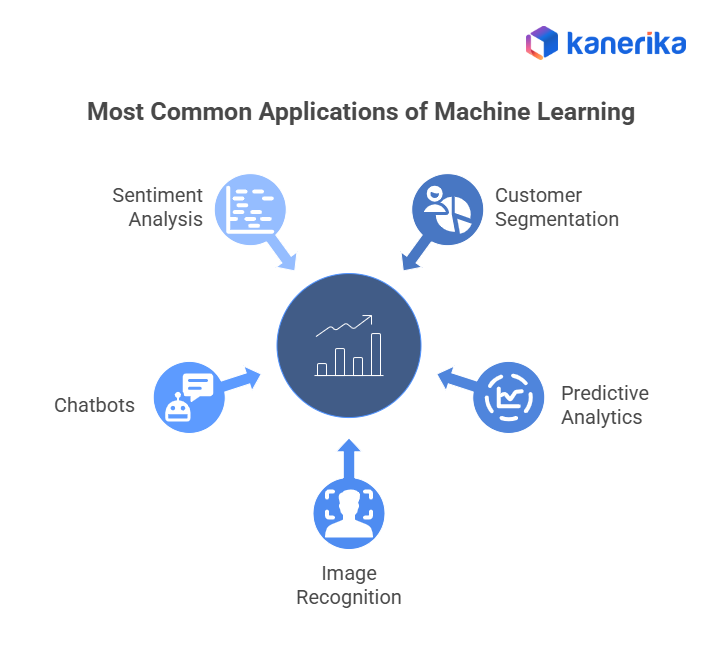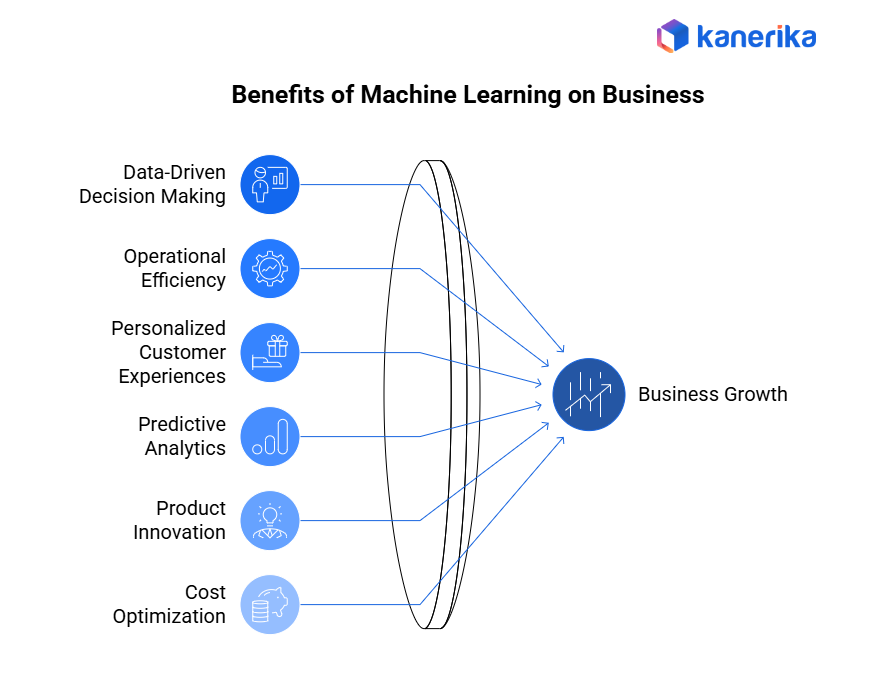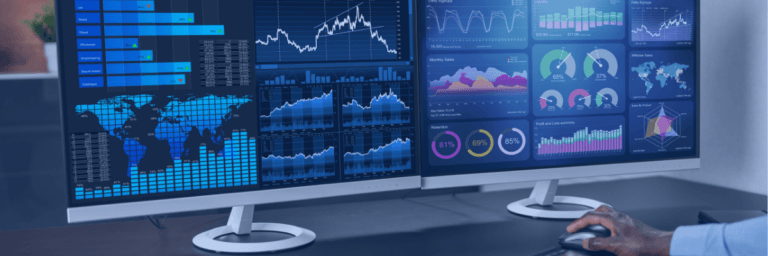Cassie Kozyrkov, former Chief Decision Scientist at Google, once said, “Machine learning is not magic. It’s math, data, and decisions.” That statement perfectly captures how machine learning quietly powers the modern world, from the apps we use every day to the systems that run hospitals, banks, and factories. It’s no longer exclusive to tech giants; businesses of all sizes now use ML to solve problems, cut costs, and make smarter, faster decisions.
According to McKinsey, over 60% of global companies have already adopted machine learning in at least one business function, with many reporting a 15–25% boost in operational efficiency. Furthermore, from fraud detection in finance to personalized shopping in retail, machine learning drives innovation everywhere. It helps doctors detect diseases earlier, enables manufacturers to predict equipment failures, and gives marketers precise insights into customer behavior.
In this blog, we’ll explore real-world machine learning use cases across industries, highlight its impact, discuss challenges, and show how organizations are applying ML step by step to gain a competitive edge.
Key Takeaways
- Machine learning transforms data into insights, automates decisions, and boosts efficiency across industries.
- ML powers personalization, forecasting, chatbots, and fraud detection to improve performance and accuracy.
- Industries like finance, healthcare, retail, and manufacturing use ML for automation, prediction, and optimization.
- ML drives growth by enabling data-driven decisions, automation, personalization, and cost efficiency.
- Key challenges include poor data quality, lack of talent, high costs, system integration, and data privacy.
- ML expands into generative AI, cybersecurity, smart cities, energy optimization, and personalized medicine.
- Kanerika builds scalable, explainable ML systems that deliver real-time insights and measurable business impact.
Turn Data Complexity into Clarity with Machine Learning
Partner with Kanerika for Expert AI/ML Implementation Services
Understanding the Power of Machine Learning in the Modern Era
Machine learning has become one of the most potent technologies shaping modern business operations. It helps organizations turn raw data into actionable insights, automate complex tasks, and make faster, data-driven decisions. Moreover, from startups to global enterprises, companies are adopting machine learning to improve efficiency, reduce costs, and enhance customer satisfaction. It is now used across industries like finance, healthcare, retail, logistics, and manufacturing to solve real-world problems and stay competitive.
Key Impacts of Machine Learning on Businesses:
- Data-driven decision-making: Machine learning analyzes large datasets to uncover patterns, helping businesses make accurate predictions and strategic decisions.
- Automation and productivity: It automates repetitive processes such as data entry, report generation, and email responses, saving time and resources.
- Enhanced customer experience: ML algorithms personalize product recommendations, marketing messages, and pricing to meet individual customer needs.
- Improved risk management: Financial institutions and e-commerce platforms use ML for fraud detection and credit scoring, ensuring secure transactions.
- Operational efficiency: In industries like manufacturing, machine learning predicts maintenance needs, reduces downtime, and optimizes production.
Machine Learning in Business Analytics 2025: From Data to Decision
Unlock how machine learning fuels business analytics, boosts decisions, and drives growth with data-driven strategies.
What Are the Most Common Applications of Machine Learning?
Machine learning applications are now deeply integrated into business operations, driving innovation and better performance across sectors. In fact, some of the most common and impactful applications include:
1. Customer Segmentation and Personalization
Machine learning helps businesses group customers based on behavior, interests, and purchase history. As a result, this segmentation enables targeted marketing and personalized communication, leading to higher engagement and conversions.
- Identifies high-value customers using predictive models
- Recommends relevant products or services based on past interactions
- Enhances customer retention through tailored offers and experiences
2. Predictive Analytics and Forecasting
Predictive analytics uses machine learning to anticipate trends, customer demands, and market movements. Consequently, companies leverage this to plan inventory, optimize supply chains, and improve financial forecasting.
- Predicts sales trends and revenue growth
- Analyzes market data for demand forecasting
- Helps businesses make proactive decisions rather than reactive ones
3. Image and Speech Recognition
Machine learning powers technologies like facial recognition, image classification, and voice assistants. These are widely used in security systems, healthcare imaging, and customer service automation.
- Enables visual search and facial authentication
- Improves diagnostic accuracy in medical imaging
- Supports hands-free operations through speech-to-text systems
4. Chatbots and Virtual Assistants
AI-driven chatbots use machine learning to understand and respond to customer queries in real time. Additionally, they provide 24/7 support, improving response times and reducing human workload.
- Handles common support questions efficiently
- Learns from user interactions to improve accuracy over time
- Enhances customer service with instant assistance
5. Sentiment Analysis and Fraud Detection
Machine learning models analyze customer feedback and social media data to gauge public sentiment toward a brand or product. In parallel, fraud detection systems identify suspicious transactions and prevent financial losses.
- Monitors online reviews and social mentions for brand reputation
- Detects anomalies in transaction patterns to prevent fraud
- Strengthens trust by improving transparency and security
Machine learning continues to evolve, and its applications are expanding rapidly. Therefore, businesses that adopt these technologies gain a competitive edge through automation, personalization, and predictive intelligence.

How Is Machine Learning Applied Across Different Industries?
Machine learning has moved far beyond labs and tech startups. Instead, it now fuels innovation across finance, healthcare, manufacturing, logistics, marketing, and more. By turning raw data into actionable insights, ML helps companies automate decisions, forecast trends, and deliver better customer experiences.
1. Finance
Machine learning plays a crucial role in fraud detection, risk modeling, and portfolio optimization. Furthermore, financial institutions rely on predictive algorithms to detect irregular transactions, assess borrower credibility, and execute real-time trading strategies. It reduces human error while improving decision accuracy.
Example: American Express applies ML to analyze billions of transactions each year, identifying potential fraud within milliseconds. Similarly, Goldman Sachs uses ML-driven trading algorithms to forecast market movements, helping the bank increase efficiency and reduce trading risks by up to 25%.
2. Healthcare
Healthcare organizations use ML to diagnose diseases, discover drugs, and predict patient outcomes. Moreover, by analyzing medical images, lab results, and patient histories, ML models help doctors make early diagnoses and provide personalized treatment.
Example: DeepMind Health (Google) collaborated with Moorfields Eye Hospital to develop an AI system that accurately detects over 50 eye conditions, matching the performance of leading ophthalmologists. Additionally, Moderna also uses ML in vaccine development, accelerating drug design and testing phases that traditionally took years.
3. Retail and E-commerce
In retail, ML drives personalization, pricing optimization, and demand forecasting. It analyzes consumer preferences, shopping habits, and feedback to deliver tailored recommendations and improve stock management.
Example: H&M uses ML-powered demand forecasting tools to analyze store data, ensuring the right inventory mix across 4,000+ outlets. Meanwhile, Zara uses ML to track fashion trends and consumer sentiment, enabling it to design and stock new collections in as little as 2 weeks.
4. Manufacturing
Manufacturers leverage ML to predict equipment failures, detect product defects, and optimize supply chains. As a result, predictive maintenance minimizes unplanned downtime and boosts production efficiency.
Example: Siemens uses ML-driven systems to monitor industrial machines and predict maintenance needs, reducing downtime by up to 30%. Similarly, General Electric (GE) integrates ML in its “Digital Twins” platform, which simulates real-world equipment to improve efficiency and performance.
5. Transportation and Logistics
Machine learning helps logistics providers optimize routes, forecast delivery times, and enhance warehouse operations. Furthermore, it analyzes historical and real-time data to improve efficiency and reduce costs.
Example: FedEx employs ML models to predict package delays and streamline global logistics. In addition, UPS, through its ORION system, uses ML to calculate optimal delivery routes, saving over 10 million gallons of fuel annually.
6. Marketing and Advertising
Marketers use ML to analyze audience behavior, improve ad targeting, and measure campaign performance. It helps brands predict what content will resonate most with users and when to deliver it.
Example: Coca-Cola uses ML to analyze social media data and customer feedback, identifying flavor trends and launching personalized campaigns. Likewise, Spotify Ads Studio uses ML to recommend ad creatives based on listener behavior, thereby significantly improving engagement rates.
How Does Machine Learning Help Businesses Grow?
Machine learning drives growth by helping companies make smarter decisions, cut operational costs, and deliver better customer experiences. In essence, it transforms data into insights that fuel innovation, efficiency, and profitability.
Here’s how ML contributes to business growth:
- Data-Driven Decision Making: ML helps organizations turn massive datasets into meaningful insights. Consequently, this enables leaders to identify market trends, consumer behavior patterns, and business risks more quickly and accurately.
- Operational Efficiency: Businesses automate repetitive tasks such as data entry, reporting, and inventory tracking. As a result, this not only saves time but also reduces human error, improving productivity.
- Personalized Customer Experiences: ML analyzes customer preferences, purchase history, and engagement data to deliver tailored experiences that boost satisfaction and loyalty.
- Predictive Analytics for Forecasting: Companies use predictive models to forecast demand, sales, and revenue trends. Therefore, accurate forecasting helps businesses optimize inventory and improve resource allocation.
- Product and Service Innovation: ML identifies gaps in customer needs and market opportunities. Furthermore, businesses can use this data to design new products or services aligned with consumer demand.
- Cost Optimization: ML streamlines workflows and automates high-cost processes such as quality checks, logistics, and HR screening, resulting in significant savings over time.

Challenges in Adopting Machine Learning
While machine learning offers major advantages, many businesses face obstacles in implementing it effectively. These challenges often involve data quality, technical expertise, and infrastructure readiness.
- Lack of Quality Data: ML models depend on accurate, clean, and well-structured data. Consequently, inconsistent or insufficient data can reduce model reliability and lead to poor decision-making.
- Shortage of Skilled Talent: Data scientists, ML engineers, and AI specialists are in high demand. Therefore, many businesses struggle to find qualified professionals who can design, train, and maintain ML models.
- High Implementation Costs: Setting up ML infrastructure, such as cloud computing and data pipelines, requires a significant investment, especially for small and mid-sized companies.
- Integration with Legacy Systems: Traditional IT systems are often not compatible with ML tools. As a result, integration is complex and time-consuming.
- Data Privacy and Security Concerns: Using customer data for ML models raises ethical and legal concerns. Therefore, companies must comply with data protection laws and ensure the secure handling of data.
- Difficulty in Model Interpretability: Many ML models, particularly deep learning algorithms, operate as “black boxes.” Consequently, this makes it difficult for businesses to understand or trust the decision-making process.
How Machine Learning in Fintech Reduces Fraud and Boosts Efficiency
Discover how machine learning transforms fintech with enhanced insights, risk detection & efficiency
New and Emerging Applications of Machine Learning
Machine learning continues to evolve, expanding into new areas that were once purely manual or human-driven. In fact, from generative AI to sustainable energy, the next wave of ML applications is reshaping industries globally.
Emerging use cases include:
- Generative AI for Content and Design: Businesses are using generative models to create text, images, videos, and marketing materials in seconds, reducing creative costs and improving campaign speed.
- Predictive Maintenance in Smart Cities: ML sensors in urban infrastructure predict equipment failures in public utilities, traffic systems, and energy grids. As a result, this reduces downtime and improves efficiency.
- AI-Driven Cybersecurity: ML algorithms detect anomalies and prevent cyberattacks in real time, learning from emerging threats.
- Sustainable Energy Management: Energy companies apply ML to forecast power usage, optimize grid distribution, and support renewable energy adoption.
- Drug Discovery and Personalized Medicine: Biotech firms use ML to identify potential drug compounds faster and tailor treatments to individual genetic profiles.
- Autonomous Systems: Machine learning powers autonomous drones, vehicles, and robots across agriculture, defense, and logistics sectors, making operations more efficient and safer.
Kanerika’s Top 5 AI/ML Models Driving Business Efficiency in 2025
Machine learning is now a key driver of digital transformation, helping businesses make smarter and faster decisions. Kanerika’s AI/ML models solve real-world problems, from forecasting demand to optimizing operations, using data-driven intelligence and automation. Here are five of the most impactful models transforming businesses today.
1. Inventory Optimization
Managing inventory efficiently is crucial for controlling costs and meeting demand. Kanerika’s Inventory Optimization model uses advanced neural time-series algorithms, such as NHITS, NBEATS, and PatchTST, to accurately forecast demand. It analyzes sales patterns, seasonality, and trends to determine optimal stock levels, reduce waste, and improve store-level efficiency.
2. Pharma Demand & Sales Forecasting
Accurate forecasting is essential for pharmaceutical companies facing changing regulations and complex markets.
This model integrates ARIMA and Random Forest Regressor to predict direct and indirect sales, pricing, and chargeback rates. It enables smarter production planning, optimized pricing, and better decision-making across the supply chain.
3. Retail Demand & Sales Forecasting
Understanding buying behavior is key to retail success. Kanerika’s Retail Forecasting model leverages ARIMA and Linear Regression to predict sales by region, product, or category. Retailers can anticipate demand, manage inventory more effectively, and plan promotions to boost customer satisfaction and sales performance.
4. Smart/Dynamic Pricing
The Smart Pricing model uses ARIMA for price trend analysis and Bayesian Optimization to recommend profitable pricing decisions. By learning from real-time market data helps businesses maximize revenue and maintain their competitive edge.
5. Vendor Advisor
Kanerika’s Vendor Advisor model employs Scalable Nearest Neighbors and Weighted Sort algorithms to rank vendors based on delivery performance, cost, and satisfaction metrics. It automates supplier evaluation, cuts operational costs, and improves procurement decisions.
Kanerika’s Machine Learning Solutions for Real Business Impact
Kanerika helps businesses build machine learning systems that deliver measurable results. Our solutions cover the entire lifecycle, from planning and architecture to deployment and monitoring. Furthermore, we focus on high-impact areas such as fraud detection, credit scoring, customer support, and risk analytics, while ensuring compliance with data privacy laws and industry regulations.
Our ML architectures are designed for scalability and speed. Moreover, they integrate seamlessly with existing systems and enable real-time transaction monitoring, predictive analytics, and automated decision-making. We prioritize explainable AI to keep models transparent and regulator-friendly, ensuring trust and accountability in every deployment.
Kanerika combines technical expertise with deep industry knowledge. Additionally, we use deep learning for document verification, natural language processing for chatbots, and advanced analytics for forecasting and risk scoring. Our platforms integrate with tools such as Power BI, Snowflake, and Microsoft Fabric, enabling businesses to modernize without replacing their infrastructure.
From retail and finance to logistics and healthcare, we tailor solutions to fit workflows and business goals. Our approach to machine learning is practical, secure, and built for scale. Therefore, with Kanerika, businesses make faster decisions, reduce costs, and stay ahead of the competition.
Accelerate Innovation with Machine Learning Solutions
Partner with Kanerika for End-to-End Support.
FAQs
What are the most common machine learning use cases today?
Some of the most popular machine learning use cases include fraud detection in banking, recommendation systems for e-commerce and streaming platforms, predictive maintenance in manufacturing, image and speech recognition, and customer segmentation in marketing. These use cases help companies improve efficiency, accuracy, and customer experience.
How is machine learning used in everyday applications?
Machine learning powers many daily tools we use from email spam filters and voice assistants like Siri or Alexa to navigation apps that predict traffic patterns. It also personalizes shopping suggestions, social media feeds, and even health tracking apps, making our interactions with technology smarter and more intuitive.
Which industries benefit the most from machine learning use cases?
Industries such as healthcare, finance, retail, manufacturing, logistics, and education benefit greatly. For instance, healthcare uses ML for diagnosing diseases and analyzing medical images, while finance uses it for risk management and algorithmic trading. In retail, ML enhances customer insights and optimizes pricing strategies.
What are real-world examples of machine learning in business?
Top global companies leverage machine learning every day. Amazon uses it to predict what customers will buy, Netflix recommends shows based on viewing habits, and Tesla applies ML in its autonomous driving systems. Even smaller businesses use it for automating tasks like lead scoring, sentiment analysis, and demand forecasting.
How do companies start implementing machine learning use cases?
Businesses usually begin by identifying key challenges that can be solved using data. They then gather clean, relevant datasets and work with data scientists or AI consultants to build and train models. Starting small with pilot projects helps test results before scaling ML solutions across the organization.








